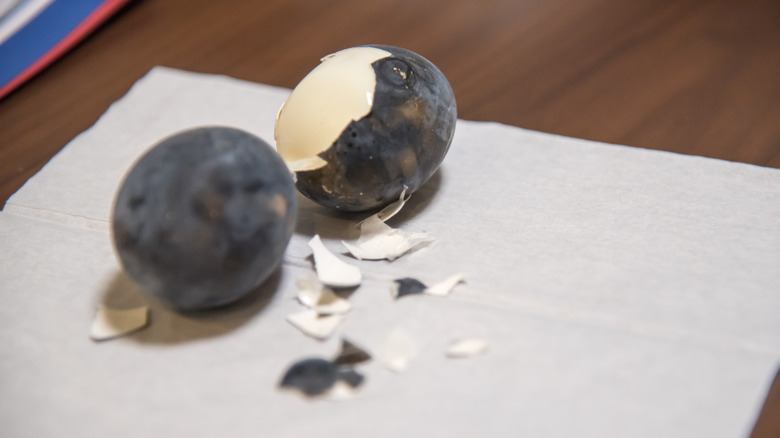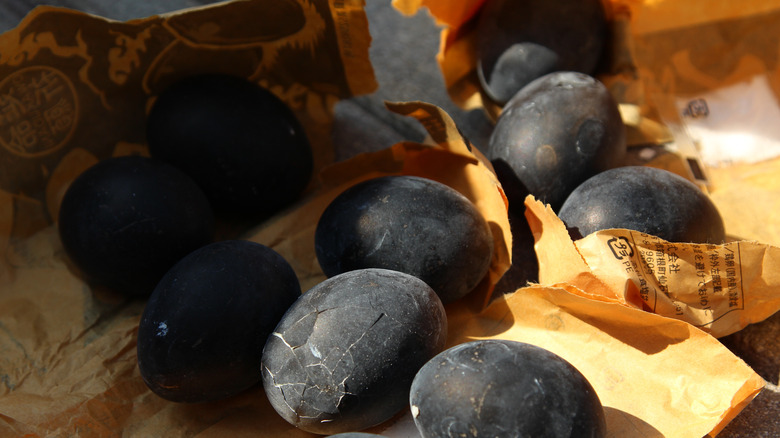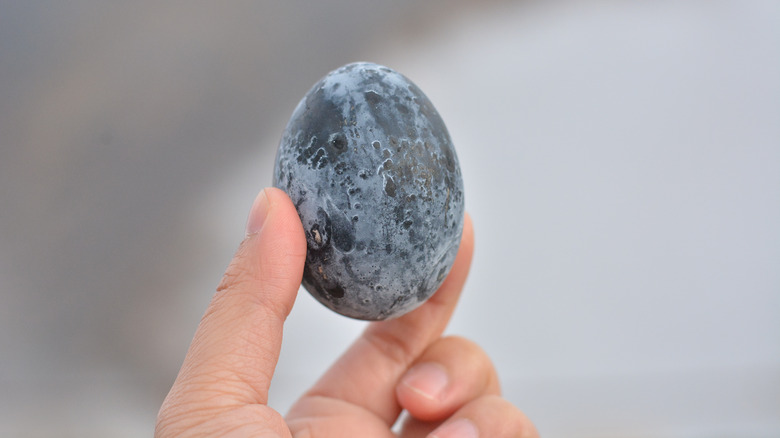The Japanese Black Eggs That Have A Mythic Quality
Japan is by no means the most sprawling country on the Asian continent. In fact, while Tokyo is the biggest metropolis in the world in terms of population, Japan as a whole is geographically smaller than California, per Global Sherpa. This makes it all the more astounding that the country is home to around 10% of the world's active volcanoes — 111, to be exact, says National Parks of Japan.
From the iconic Mount Fuji to Sakurajima to Mount Unzen, the Japanese archipelago has ample domain along the seismic heat chain ominously dubbed the Ring of Fire, per National Geographic. Along this stretch is the volcanic valley of Owakudani, which is located on Fuji-Hakone-Izu National Park grounds. According to Atlas Obscura, the valley's eponymous Mount Hakone blew its top thousands of years ago, leaving behind a massive crater filled with tourist-attracting hot springs that clear a view of Mount Fuji.
Those who visit would be remiss not to try the mountain town of Hakone's local delicacy: Chicken eggs boiled in the sulfuric hot springs. According to legend, eating a single Owakudani black egg (also known as kuro tamago) can have some life-altering healing effects. But to reach the vendor who sells them, customers have to traverse a path that's often subject to dangerous landslides and other effects of volcanic activity, per Atlas Obscura. It's no wonder that Owakudani is sometimes referred to as the "Death Valley."
One black egg equals seven years of life
Local legend has it that kuro tamago — which are boiled daily in their mineral-rich cauldron and limited to five per customer, per Atlas Obscura — have special healing powers. This is thanks to the hot springs' jizo statue, a "guardian deity of children" that was allegedly carved by Kobo Daishi during the Heian Period, per Owakudani's tourist website. This particular jizo is said to serve as a "good luck symbol for extending lifespans," which, per the legend, means that each kuro tamago adds seven years to the life of the person that consumes it. Why seven? According to the site, the number seven gets its lucky status from the Seven Deities of Good Fortune.
To prevent scammers from making a buck off of inauthentic black eggs, the site claims that true kuro tamago are only sold at the Tamago Tea Shop, Owakudani Kurotamago-kan, Yu land, and the Gokuraku Tea Shop. If you want to try one for yourself, you now have the perfect excuse to book a ticket to Japan.
Deep color yields deep flavor
According to Owakudani vendors, the hue of the town's famous kuro tamago comes from iron sulfide, which is "a result of a reaction with hydrogen sulfide" after raw eggs are boiled in the valley's hot springs. The eggs may taste and smell a bit more sulfuric than your average hard-boiled egg, but that doesn't mean they're not delicious. In fact, the minerals in the springs may give them even more depth of flavor. The FAQ section of Owakudani's website claims that the eggs contain "approximately 20% more umami flavoring" than regular-old eggs, though others say that they just taste like regular boiled eggs, per Talking Fork.
Tokyo Weekender writes that the eggs are boiled for an hour in the hot springs, which run around 175 degrees Fahrenheit, and are steamed for another 15 minutes in steel baskets. As a result, the entire town of Hakone is bathed in the distinctive aroma of eau de oef.


